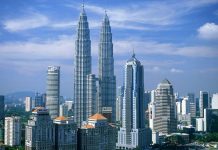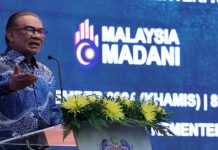Highlights:
- SOCSO coverage extended to spouse from 1 July
- Households not affected by electricity surcharge for July-December
- Malaysia, Indonesia agree to counter Europe’s anti-palm oil campaign
- Domestic tourism expenditure up 11.1 per cent in 2017
- Penang International Airport achieves 3 million passenger traffic mile stone in Jan-May
- Hong Kong International Airport to introduce charge for putting luggage onto carousel
SOCSO coverage extended to spouse from 1 July
Human Resource Minister M. Kulasegaran has approved the extension of social security protection to the spouse termed ’employee’ in a husband-wife business. Amendments to the Employees’ Social Security Act 1969 (Act 4) and Employment Insurance System Act (Act 800) have been recorded in the Government Gazette and will go into effect on July 1, 2018, a statement from the Social Security Organisation (SOCSO) said. From this date, failure of an employer (who is either the husband or wife) to register and contribute to SOCSO as stipulated by the Acts, will result in imprisonment of up to two years, a fine not exceeding RM10,000 or both, if convicted. With the change in Act 4, the spouse a.k.a. employee, will attain a medical benefit, temporary disablement benefit, permanent disablement benefit, dependants’ benefit, funeral benefit, education benefit, invalidity pension, invalidity grant, survivors’ pension, constant-attendance allowance and access to facilities for physical or vocational rehabilitation, including a Return to Work Programme. Under Act 800, the person will secure a job search allowance, early re-employment allowance, reduced income allowance, training allowance, training fee and benefit from a re-employment placement programme.
Households not affected by electricity surcharge for July-December
Households will not be affected by the government’s move to continue with the Imbalance Cost Pass-Through (ICPT) surcharge for the period of July 1-Dec 31, 2018. Tenaga Nasional said non-domestic users, however, will have to pay more for their electricity, with a surcharge of 1.35 sen per kilowatt per hour (kWh), due to higher fuel and generation costs. “Domestic customers with monthly consumption below 300kWh will not be affected by this ICPT implementation, but for those with monthly consumption above 300kWh, the ICPT surcharge will be funded by Kumpulan Wang Industri Elektrik,” it said.
Malaysia, Indonesia agree to counter Europe’s anti-palm oil campaign
Malaysia and Indonesia, the world’s biggest producers of palm oil, have agreed to counter the anti-palm oil campaign in Europe. Malaysian Prime Minister Tun Dr Mahathir Mohamad said this at a joint media conference in Jakarta with Indonesian President Joko Widodo. The European Union (EU) seeks to phase out palm oil from transport fuel. However, earlier this month the EU lawmakers agreed to defer the ban to 2030 from 2021.
Domestic tourism expenditure up 11.1 per cent in 2017
The domestic tourism expenditure recorded an increase of 11.1 per cent in 2017 to RM83.1 billion. The Department of Statistics said this was a twofold increase when compared with the figure in 2011. The biggest component for domestic tourism expenditure was shopping, constituting a share of 36.3 per cent, followed by purchase of automotive fuel (15.2 per cent) and food and beverage (13.8 per cent). The number of domestic visitors also recorded a steady growth with an increase of 8.5 per cent to 205.4 million in 2017 from 189.3 million in 2016, supported by visits to relatives and friends.
Meanwhile, Penang has announced that passenger movement at Penang International Airport in Bayan Lepas has reached 3,075,643 from January to May 2018. Penang Tourism Development, Heritage, Culture and Arts Committee chairman Yeoh Soon Hin said this was an increase of 5.77 per cent in comparison to last year’s passenger traffic for the same period. Yeoh said, there were 1.5 million passenger arrivals which consist 680,000 international arrivals and about 840,000 from domestic flights. “International arrivals recorded an increase of 15.39 per cent as compared to the same period last year, while domestic arrivals registered only 0.26 per cent increase,” he said.
Hong Kong International Airport to introduce charge for putting luggage onto carousel
Hong Kong International Airport is to introduce a fee for each piece of baggage unloaded from planes onto conveyor belts – a move that could cost passenger airlines HK$40 million (US$5.1 million) or more a year. Two sources told the Post that the operator of Hong Kong International Airport, the Airport Authority, had informed them it would levy HK$1.32 per bag from July 6. With the new fee, airlines face paying two sets of baggage costs if they are still under an existing contract with their ground handling company. Currently, airlines use these companies to handle all necessary duties under the wing of a plane once it arrives, such as unloading luggage from the hold onto carts and putting them on conveyor belts that lead to the baggage reclaim area. The authority has decided to take the role of moving bags from the carts onto the belts by outsourcing this to workers – but passing on the cost to the ground handling companies who will pass this on to airlines. It said this would ensure bags got to travellers faster.














